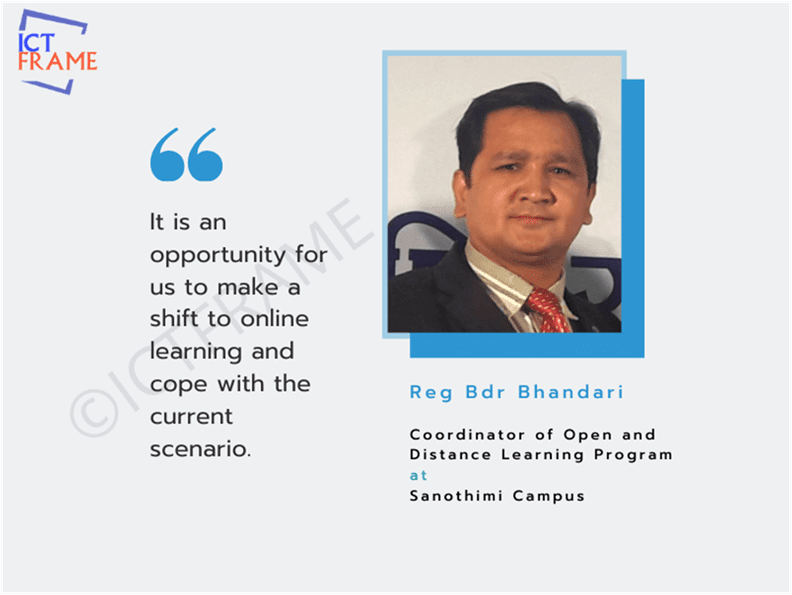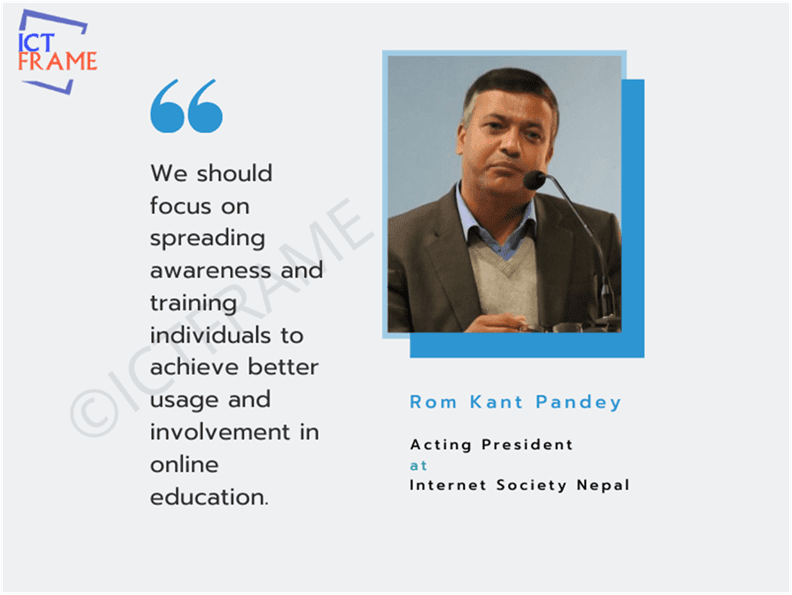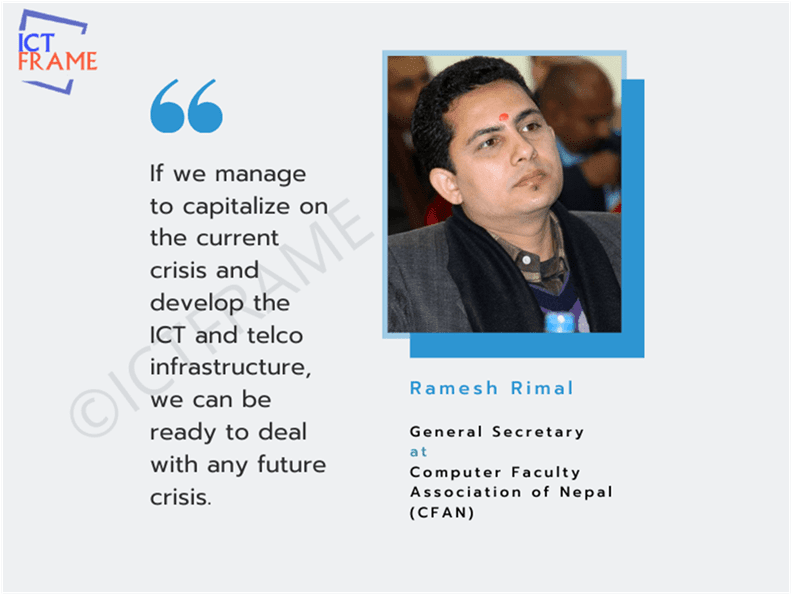With More Online Classes in Lockdown, Practice Without Preparation
Kathmandu, 29th April 2020
The global crisis of COVID-19 has affected every sector possible. The biggest impact of the pandemic is seen in industry and education. Schools and colleges have been shut down due to the lockdown in Nepal.
Along with SEE, exams of 11 and 12 also have been postponed indefinitely. The World Health Organization (WHO) has advised maintaining social distancing for a few months after the lockdown. With the future of students at hold, most educational institutes have started online classes without preparation.
Most developed countries already had the facility of online education and distance learning. However, there are no guidelines in the context of Nepal and the resources have not reached everywhere. There are certain factors to consider such as the financial capacity of Nepali students and parents, e-readiness of teachers and students, and ICT resources of Universities.
Let’s get an insight into the opportunities, challenges, and a way forward for the implementation of online education in Nepal.
Reg Bahadur Bhandari – Coordinator of Open and Distance Learning Program, Sanothimi Campus

We hadn’t given priority to online alternatives for the education process prior to the pandemic. At present, the lockdown in Nepal has given us an opportunity for a paradigm shift. And, online education has become an urgency rather than a need today.
The crisis has taught us that we need to be ready with an alternative in order to cope with the challenges. So, it is an opportunity for us to make a shift to online learning and cope with the current scenario.
I believe both the challenge and the solution are ICT infrastructure. The mobile phone usage in Nepal is quite satisfactory but it might not be the same for the internet coverage. Although the usage of broadband internet is 64%, the dedicated service is quite less.
One of the major challenges is the expansion of network coverage throughout the nation. Another can be the availability of resources and devices in the school and college infrastructures. Similarly, an issue that students face currently is the unavailability of standard content online.
The telco industry needs to drive their attention to expanding optic fiber technology wherever possible. Similarly, we need to focus on developing the TPACK (Technological Pedagogical Content Knowledge) model. The technological, pedagogical, and content knowledge should be integrated as a way forward to improve online education in Nepal.
Without the proper study and integration of this model, the plans and strategy for online education in a rush might go to drain. To assist the government in implementing proper plans and policies, the private organizations need to show active participation. So, a Public-Private partnership model can also help tackle the challenges and show us a way forward.
You May Also Like: The Digital Nepal Movement of the Government, How Can Telco and ICT Sectors Support it?
Romkant Pandey – Acting President, Internet Society Nepal
Opportunities for online education in Nepal
The movement that has started in the current scenario towards digitizing education materials is perhaps an excellent opportunity for digital learning. We hadn’t been able to address digital pedagogy and digital issues for a long time. The COVID-19 pandemic has provided good scope for integrating ICT with our education process.
Currently, most educational institutes in Nepal are going forward with 3 important topics. Firstly, they are using online tools for video conferencing to facilitate virtual classes. The most popular tools in use are Zoom, Microsoft Teams, and Google Meet. The crisis has forced both teachers and students to adapt to digital platforms and learn how to use them.
Similarly, another thing that the institutes are focusing on is the availability of educational materials or content. The level and quality of these materials are still unclear. But at least, the lecturers and professors have started creating content for the students to assist self-learning.
Even social media platforms are being used to develop and deliver learning tools. The third topic that we are focusing on is the delivery of both information and content through several websites and souces. So, we are prioritizing digital content for long-term use to develop self-learning habits as well.
Basically, plans are going on to make Nepal’s education competitive and global using online alternatives.

Challenges for implementing online education in Nepal
The shift to online education is actually a part of the contingency plan. It was basically forced by the current pandemic and lockdown in Nepal. Due to this, the main issue is the connectivity and availability of resources in rural areas.
Also, the financial situation of people in rural areas might be a hurdle in purchasing data packs or broadband services. Another challenge that we are facing is the inability of some Universities and government to produce standard guidelines. If our lives return back to normal, then the investments and attempts that are being made today might be useless.
Similarly, we need to develop proper policies to facilitate online activities and not only focus on reading materials. So, we have to focus on how to sustain the resources to make online education a long-term strategy.
You May Also Like: Online Education in Nepal, Are We ‘E-ready’? E-readiness
The Way Forward
The Ministry of Education has made a task force to focus on online education and I’m also a part of it. To go forward with the digital education process, we believe it is important to extend the network infrastructure. All schools and colleges need to be included under a sole educational network that should facilitate content delivery and availability of online resources.
Our primary focus is to deliver reliable and affordable resources where they haven’t reached yet. Also, we are focusing on generating Nepali content on different levels and delivering them in an interactive way. And, to access the content, an educational national level portal should be used.
It will also solve the issue of unavailability of material as well as scattered material which is difficult to locate online. So, it will help in the integrated management of resources for long-term use.
Another thing that we have to address is digital literacy. We have to empower the people and train them to use digital resources. So, we should focus on spreading awareness and training individuals to achieve better usage and involvement in online education.
Ramesh Rimal – General Secretary at CFAN
From what I have seen, most educational institutes are only prioritizing video conferencing. A crisis not only opens up problems but it also opens up a world of opportunities. In the context of Nepal, we have finally realized the importance of online education and we are practicing e-learning.
However, we are seeing this opportunity as a contingency rather than a long-term strategy to digitize our education process. There still exists a huge gap that we call the digital divide in the nation. So, have we been addressing the availability of resources and network coverage in remote areas?
The proper guidelines and inequality in resources are the major challenges for us at present. But, if we manage to capitalize on the current crisis and develop the ICT and telco infrastructure, we can be ready to deal with any future setbacks or crisis.
For any new policy or adaptation, we require proper planning and guidelines. In the current scenario, schools and colleges are initiating off-classroom learning by hearing about other institutes starting the same. This ideology can fail if proper planning of resources and platforms is not done before initiating online classes.
However, the important thing is the initiation of an effective alternative to our education process. There are always positive and negative sides to every initiative but right now, our focus should be on the pros that this initiative will bring. But, in the long run, individual educational institutes might need to think about purchasing or developing a dedicated learning management system.
The government can’t work alone on this without assistance from private organizations. The government should come up with proper policy and preparation while the concerned bodies should implement them. And, the major area of focus needs to be on the development of ICT infrastructure.
Conclusion
The initiation of online education itself is a major deal that will bring its challenges to light. The only educational institute in Nepal that seems unaffected due to the lockdown or the pandemic is Nepal Open University. This fact has raised several questions regarding proper policies, programs, and guidelines for e-learning.
Looking at the stats, we do have the potential to initiate the next phase of digital learning. However, another hurdle is the chances of the digital divide due to a full-fledged implementation of online education.
Will developing the ICT infrastructure and network coverage be enough? Do we have the resources and manpower to tackle the challenges and go forward?
Let us know in the comments!
Related Articles
Fusemachines Launches AI-Enabled Classroom | Will AI Shape the Education Sector?
How Telecoms Industry Can Keep Everyone Connected Amid The Pandemic
Tribhuvan University Issued Guidelines For Teaching Through Online Classes







